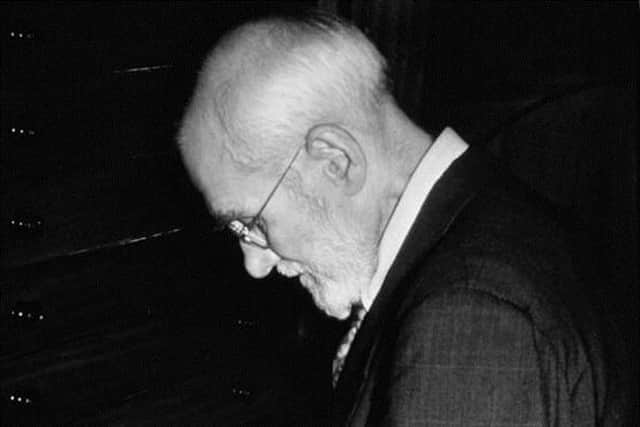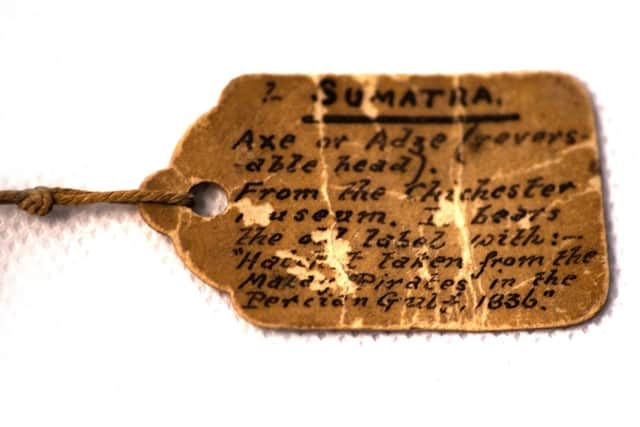The story of a Sussex-born anthropologist and ethnographic collector and his staggering world objects collection


Although best known for his contribution of over 6,800 Pacific artefacts to the Field Museum in Chicago, Fuller also played a significant role in the history and collection of The Novium Museum in Chichester.
Born in on March 29, 1882, Fuller was the second son of the Rev Alfred Fuller. Mr Fuller helped form the Museum of the Chichester Literary and Philosophical Society in 1831 and was an honorary curator from 1881-1886.
Advertisement
Hide AdAdvertisement
Hide AdHis huge personal collection of butterflies, fossils and scientific engravings, and interest in collecting, may have inspired his son’s interest in geography and antiquarianism.


In 1896, Mr Fuller took his 14-year-old son to Stevens’ Auction Room in London, where he purchased a Fijian club for six or seven shillings. Fuller later described the club as a ‘great treasure’.
This club was the first of what was to become Captain Fuller’s staggering world objects collection and is widely credited to be what sparked his interest in collecting and other cultures.
At the outbreak of the First World War, Fuller joined the Oxfordshire and Buckinghamshire Light Infantry and rose to the rank of captain while serving on the Salonika Front. He also saw action in Bulgaria.
Advertisement
Hide AdAdvertisement
Hide AdHowever, by 1918 he had retired on a disability pension due to a hearing impairment. After serving as a captain in the First World War, he returned to London but did not return to his previous occupation.
Fuller had studied law at King’s College London with the intention of becoming a lawyer, however, unable to pursue his career in law due to his partial loss of hearing, Captain Fuller became a keen anthropologist and ethnographer and a key benefactor of several museums.
Fuller volunteered at the British Museum for a time and was a Fellow of the Royal Anthropological Institute. He became honorary curator in the ethnological department at the British Museum and continued collecting.
In 1924, Fuller married Estelle Cleverly. Estelle was also a keen collector and was specifically interested in Asian and Scandinavian collections. With their shared interest, the Fullers soon started collecting together and, just as father and son had shared a passion for collecting, so husband and wife together devoted their lives to their collections.
Advertisement
Hide AdAdvertisement
Hide AdAlthough Fuller never travelled to the Pacific, he was fascinated by its cultural diversity. During the 18th and 19th centuries, a large quantity of Polynesian artefacts made their way to England through explorers, missionaries, traders and colonists.
Fuller built up his collections through discerning purchases at various sales but never became a dealer in these artefacts. Over a period of 62 years, Fuller acquired thousands of items from sales in private homes, auction rooms, shops of dealers in Britain and mainland Europe, and the selling up of inventories of small provincial museums throughout England and Scotland, including the museum in Chichester.
Records indicate that in 1911, Fuller paid £210 for ethnographic material in dispersal of the original Chichester Museum. Items in Fuller’s collection purchased from the struggling Chichester Museum include some Chinese scales, which Fuller purchased during the lengthy closure of the Chichester Institute in 1912. They were originally donated to the Chichester Literary and Philosophical Society on February 23, 1863, by Mr C. Vick, a builder in West Street.
A Sumatran axe was also acquired from the original Chichester City Museum, with its old museum object label still attached indicating the item was ‘taken from Malay Pirates in the Persian Gulf’ in 1836. After Fuller’s death, these items made their way back to the museum’s collection along with a number of other items donated to the Chichester Museum in 1963 by Fuller’s widow. They now from part of The Novium Museum’s ethnographic collection.
Advertisement
Hide AdAdvertisement
Hide AdOriginally, the museum’s collection consisted of many such ethnographic and natural history specimens as there was no official collecting policy. This contrasts with The Novium Museum’s current collection policy, which focuses on items with a strong link to Chichester district. However, due to their association with the history and development of the museum, these items remain within The Novium Museum’s care.
Although some items from Fuller’s collection remain in Chichester, the majority of his collection is now housed at The Field Museum in Chicago. Throughout the formation of his collection, Fuller paid close attention to the study of comparative technology and the evolution of design.
Fuller’s collection therefore includes varieties of all types of materials and arrays of object types that exemplify this guiding principle. Because of its unique nature, Fuller hoped that the majority of his collection would remain together for future study, exhibition, and preservation.
In 1958, Fuller sold his collection of South Pacific objects, specifically relating to the Rapa Nui (Easter Island culture), to the Chicago Natural History Museum, now The Field Museum.
Advertisement
Hide AdAdvertisement
Hide AdFuller died on December 13t, 1961. In the 20 years after his death, his widow, Estelle, generously deposited much of her husband’s Sussex collection in the public domain, as a memorial to her husband.
She presented to the old Chichester City Council a fine collection of paintings by the Smith brothers of Chichester and the West Sussex Record Office received a rich collection of manuscripts, books and prints.The Novium Museum has also benefited from Estelle’s generous donations, as she gave the then Chichester District Museum some items relating to local history.